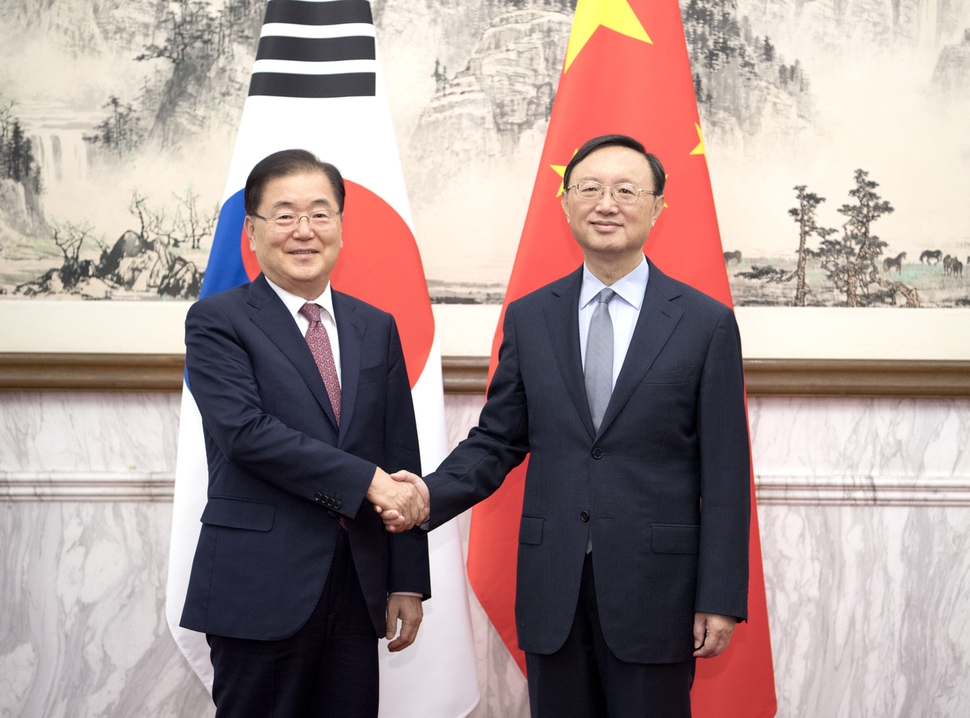 |
|
Blue House National Security Office Director Chung Eui-yong shakes hands with Chinese Community Party Central Committee politburo member] Yang Jiechi in Beijing on Sept 8. (provided by the Blue House)
|
Sends special envoys to US, China, Japan and Russia to solicit international cooperation
The Blue House has begun “mediation diplomacy” efforts by sending special envoys to the US, China, Japan, and Russia in a bid to stoke the embers of talks toward the Korean Peninsula’s denuclearization and an end-of-war declaration. With North Korean leader Kim Jong-un recently announcing plans to “denuclearize the Korean Peninsula with [US President] Donald Trump’s first term” to a visiting special envoy delegation, Seoul is now using that commitment as a basis to solicit cooperation from the other countries involved and form a climate for dialogue. On Sept. 8, Blue House National Security Office Director Chung Eui-yong – previously the senior special envoy – paid a one-day visit to China. Upon his return, he explained that he had held “broad-ranging discussions with [Chinese Community Party Central Committee politburo member] Yang Jiechi on the recent Korean Peninsula political situation and ideas for advancing relations between South Korea and China.” “China praised the outcome of the special envoy delegation’s North Korea visit and agreed to provide active cooperation, expressing hopes that the upcoming inter-Korean summit [in Pyongyang] and the South Korea-US summit scheduled to take place during the UN General Assembly session [in late September] will be a turning point toward a historic resolution to Korean Peninsula issues,” Chung said. According to the Blue House, the meeting between Chung and Yang took place at the Diaoyutai State Guesthouse in Beijing, starting at 11:30 am and continuing for four hours including a luncheon. Chung also made reference to plans for a summit between South Korean President Moon Jae-in and Chinese President Xi Jinping. “We agreed to pursue a summit between President Moon and President Xi around the time of the multilateral meetings happening in the second half of the year, and to continue discussions toward an official visit by President Xi in the near future,” he said. But Chung provided no response when asked about discussions with Beijing on an end-of-war declaration, which the Blue House is aiming to achieve within the year. On Sept. 10, Chung is scheduled to have a second telephone conversation with White House National Security Advisor John Bolton after a previous one on Sept. 6. Seoul may “hear about the US’s final position and response to the special envoy delegation’s North Korea visit” during the call. Chung also spoke to Russian Federal Security Service director Nikolai Patrushev by telephone on Sept. 7 to explain about the visit’s outcome. National Intelligence Service (NIS) director Suh Hoon, who visited North Korea with Chung as a member of the delegation, traveled to Japan on Sept. 9 for a two-day trip. Visiting as a special envoy for President Moon, Suh was scheduled to meet with Japanese Prime Minister Shinzo Abe on Sept. 10 to explain about the North Korea visit’s outcome and enlist Tokyo’s cooperation in the resumption of North Korea-US dialogue. The Blue House’s decision to send special envoys to neighboring countries as it did with the first special envoy delegation visit to North Korea is a bid to gain cooperation toward reviving Pyongyang and Washington’s talks on denuclearization and an end-of-war declaration, which are currently at an impasse. “It’s significant as an attempt to enlist cooperation by special envoys to restore momentum to the North Korea-US talks,” a Blue House senior official said. By Seong Yeon-cheol, staff reporter Please direct comments or questions to [english@hani.co.kr]






